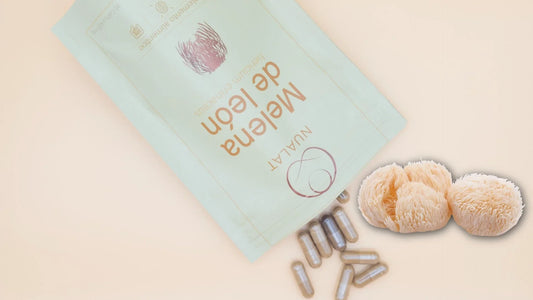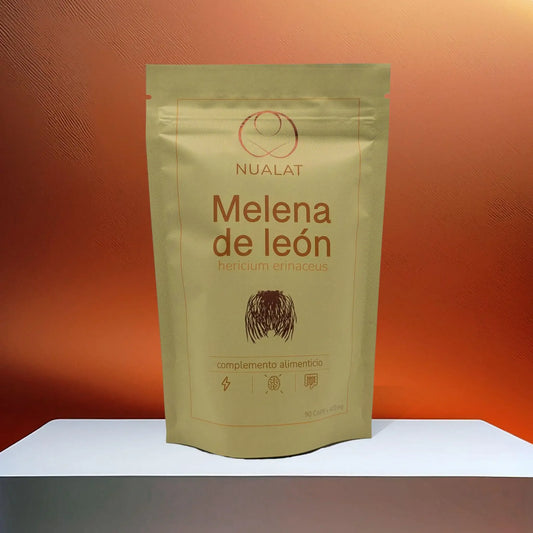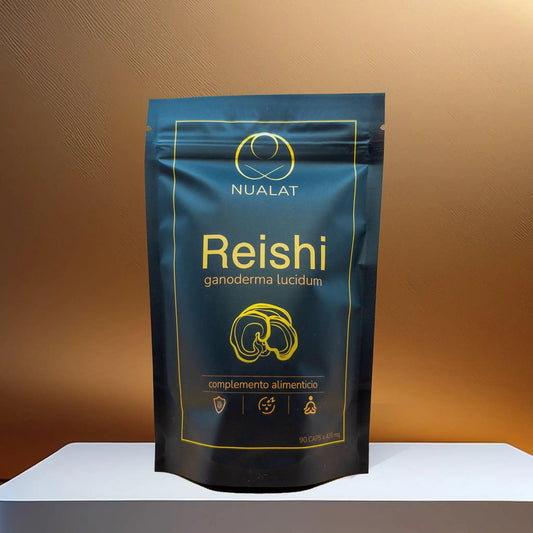
Reishi and Allergies: The power of Ganoderma lucidum, your ally this spring
Share
Ganoderma lucidum , commonly known as Reishi , is a medicinal mushroom with over 2,000 years of history in traditional Asian medicine. In recent decades, modern science has begun to decipher the mechanisms by which this mushroom can act as an immune system modulator , particularly useful in the management of allergic reactions and chronic inflammatory diseases.
Authors such as Neha Bhardwaj, Priya Katyal (Punjab Agricultural University) and Anil K. Sharma (Maharishi Markandeshwar University) have highlighted the pharmacological potential of Reishi in a review published in Recent Patents on Inflammation & Allergy Drug Discovery (2014) . It details both its molecular mechanisms and its applications in international patents.
Allergies and inflammation: a dysregulated immune response
Allergies are a form of immune hypersensitivity , in which the immune system overreacts to harmless substances such as pollen, food, or dust mites. This type of reaction, known as an IgE-mediated type I response , activates cells such as mast cells and basophils , releasing histamine , leukotrienes, and other inflammatory substances that cause symptoms such as sneezing, swelling, itching, or shortness of breath.
How does Reishi work against allergies?
Reishi contains more than 400 bioactive compounds , including triterpenes , beta-glucans , and immunomodulatory polysaccharides . These substances act on multiple levels of the immune system and can:
1. Inhibit the release of histamine
Ganoderic acids C and D , characteristic triterpenes of Reishi, have been shown to block the release of histamine from mast cells by interfering with antigenic-stimuli-dependent calcium channels. This prevents the activation of the mechanisms that trigger the allergic reaction.
2. Regulate the TH1/TH2 balance
Chronic allergies are often related to an imbalance between type 1 (TH1) and type 2 (TH2) T cells. Reishi helps restore this balance by reducing the TH2 predominance associated with prolonged allergic inflammation.
3. Reduce the production of inflammatory cytokines
Ganoderma lucidum extracts have been shown to decrease the expression of TNF-α , IL-6 , IL-1β and other key inflammatory molecules, by inhibiting intracellular pathways such as NF-κB and AP-1 . These transcription factors are directly involved in the inflammatory signaling cascade.
4. Stabilize mast cell membranes
In addition to preventing the release of histamine, Reishi compounds strengthen cell membranes , making degranulation difficult and therefore moderating the intensity of the allergic reaction.

Scientific evidence and international patents
The effectiveness of Reishi has been the subject of numerous pharmaceutical patents . Among the most notable:
-
US20090060939 : describes the use of Ganoderma lucidum extracts to treat allergies and autoimmune diseases, including the reduction of IgE levels.
-
US6893641 and EP1398036 : address the use of activated Reishi spores to treat immunological disorders, including diseases such as lupus and allergic dermatitis.
-
US7947283 : validates its use in the treatment of psoriasis through the modulation of cytokines such as IL-10 and IL-1Ra.
Reishi vs. Traditional Antihistamines
Unlike conventional antihistamines, which act only occasionally and can cause side effects (such as drowsiness or dryness), Reishi modulates the immune response at its root . Rather than simply blocking symptoms, it helps restore the immune system's physiological balance, making it a safer and more sustainable alternative over the long term .
How to take Reishi to combat allergies?
For Reishi to be effective against allergies, it is important to choose a quality supplement:
-
🌿 Form : fruiting body extract, not mycelium.
-
💊 Concentration : preferably 20:1, standardized in triterpenes and beta-glucans.
-
📈 Recommended dose : between 500 and 1000 mg daily.
The effect is cumulative: it may take several weeks to notice improvements, as it involves a progressive modulation of the immune system.
Reishi (Ganoderma lucidum) is one of the most complete natural adaptogens that exist, with a unique ability to regulate inflammation, balance the immune system and moderate allergic reactions .
Thanks to its high concentration of immunomodulatory compounds , its continued use can offer a comprehensive and safe approach for those seeking natural alternatives to conventional allergy treatments .
Rather than silencing symptoms, Reishi proposes a fundamental strategy: restoring immune balance and preventing them from the root cause.
Would you like to incorporate Reishi into your health routine? Discover our Reishi today and start improving your spring allergies.





